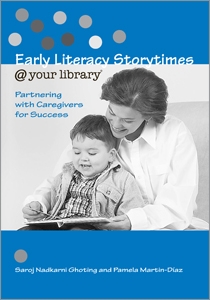Primary tabs
You don't need to be an ALA Member to purchase from the ALA Store, but you'll be asked to create an online account/profile during checkout to proceed. This Web Account is for both Members and non-Members. Note that your ALA Member discount will be applied at the final step of the checkout process.
If you are Tax-Exempt, please verify that your account is currently set up as exempt before placing your order, as our new fulfillment center will need current documentation. Learn how to verify here.
- Description
- Table of Contents
- About the authors
Research confirms that reading success starts with young children enjoying library storytimes! Preschoolers' earliest experiences with books and reading are important; parent/caregiver knowledge can build on those experiences, according to research from the National Institute of Child Health & Development, conducted with PLA and ALSC, the co-initiators of the Every Child Ready to Read@your library® program.
Author experts Ghoting and Martin-Diaz combine this cutting-edge early literacy research, which is the heart of the Every Child Ready to Read program, with practical implementation tips for busy children's librarians. Scripts and plans help librarians explain what adults can do to enhance children's print motivation, phonological awareness, vocabulary, narrative skills, print awareness, and letter knowledge. Proven, step-by-step methods address planning, promoting, and assessing this richly informative new kind of storytime. Children's librarians and early childhood experts can:
- Integrate early literacy research and parental how-to into storytimes
- Help parents develop self-sufficiency in nurturing their children's early literacy skills
- Address the developmental needs of early talkers (newborn–2), talkers (age 2–3), and pre-readers (age 4–5)
- Use the tips, tools, promotional samples, and assessments to build on current programs
Storytime is the perfect time to offer guidance to parents so they can better prepare their children to be successful readers. Here's a proven way for adults to enhance children's reading readiness.
Introduction
I. The Early Literacy Enhanced Storytime—Background
Chapter 1. Early Literacy Research—Explained
Chapter 2. Incorporating Key Early Literacy Concepts Into Storytime
Chapter 3. Dialogic Reading: How We Read With Children Makes a Difference
Chapter 4. Making Early Literacy Storytimes Accessible to ALL Children
Chapter 5. Early Literacy and Speakers of Languages Other Than English
II. Doing It
Chapter 6: Planning Your Literacy Enhanced Storytimes
Chapter 7: Storytimes for Early Talkers (newborns to 24 months)
Chapter 8: Storytimes for Talkers (two- and three-year-olds)
Chapter 9: Storytimes for Pre-readers and early readers (four- and five-year-olds)
Chapter 10: Build Your Own Early Literacy Storytimes
III. Keeping it Going
Chapter 11. Assessing Your Storytime
Chapter 12. Promoting
IV. Appendices
Appendix A. Manual Alphabet
Appendix B. Encouraging early literacy at home
Sample Parent Tip Take-Home Pages
Sample Parent Letters
Appendix C. Storytime Aids
What Can I Say? From Skill to Parent/Caregiver
General Ideas for Each Skill
Sample of Storytime Planning Sheet
Appendix D. Early Literacy Aids
Sample Bookmarks for Dialogic Reading
Sample Skills Poster
Language of Literacy Hand-out
Letter Sounds for Letter-Day Activities
Appendix E. Resources
Appendix F. Books/CDs Used in Cuddle-Up Storytime Samples
Saroj Nadkarni Ghoting
Saroj Nadkarni Ghoting, an early childhood literacy consultant, worked on the PLA/ ALSC initiative, Every Child Ready to Read @your library®. She implemented the program at Maryland's Montgomery County Public Library when she was early childhood services coordinator. A children's librarian since 1976, she stays in touch with public service by working at Neill Public Library (Pullman, WA) and Moscow (ID) Public Library. She received her MLS from Catholic University. Follow her on Twitter at @sghoting.
Pamela Martin-Diaz
Pamela Martin-Diaz is branch manager of the Allen County Public Library in Fort Wayne, Ind., where she was a major writer of an early literacy grant, funded by the Lilly Foundation, which established early learning centers in branches and purchased materials for parents to use with their young children to promote letter and sound awareness. She developed a set of cards called "Playing with Words on the Go!" designed to help children with phonological awareness as well as the game "Letter Play Sets" (available through Allen County Public Library), both of which help libraries incorporate early literacy in their story times. Pamela has presented workshops and seminars on early literacy in several venues, as well as presented numerous training sessions locally for Head Start and other early childhood providers.



